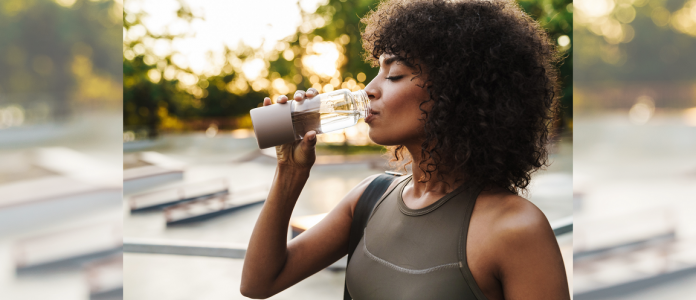We all know that we should be drinking around 2 litres of water a day…but that’s often easier said than done.
Between busy schedules and keeping up with life, you probably find yourself crashing on the couch ready to chill after a long day, only to realise that you haven’t had nearly enough water today – or none at all! It’s time to change that.
So why is it so important to hydrate regularly?
The human body is basically 60% water. Throughout the day, we lose fluids (particularly water) through sweating, exhaling and waste elimination. Hydrating helps to replenish those fluids to keep the body functioning optimally, especially the brain and kidneys, as these organs carry the highest percentage of water. It is also responsible for protecting organs like the spinal cord, transportation of oxygen through the body, temperature regulation and lubrication of joints.
It is therefore crucial that we maintain a good balance between how much water we take in and how much leaves our body.
How will you know if you are drinking enough water?
- You would be passing urine every few hours (on average 2-4 hours).
- Your urine should be colourless or a pale yellow.
- You rarely feel thirsty.

How will you know if your body lacks water?
Well, the opposite of the above with a few more symptoms such as:
- fatigue
- dry mouth & tongue (can be white as well)
- feeling light/headed
- joint and muscle pain
- headaches
- constipation
- poor mental performance.
If you are dehydrated for a long time, it might even lead to urinary tract infections, kidney stones and poor skin health.
How to up your water intake:
It is difficult to put a standard number on how much water one should drink. Many factors play a role in the daily requirements of hydration, including; age; sex; body fat/muscle percentages; and accelerated fluid losses through disease, exercise, and a hot climate. Regardless, it is good to train yourself to adopt the below habits:
- Carrying a water bottle for easy access
- Choosing water over sugar sweetened beverages
- Choosing water when eating a meal out
- Adding a wedge of lemon to improve taste (also aids in prevention of kidney stones)
- Drinking water before and after exercise
- In older adults, it’s important not to wait until you feel thirsty to drink fluids, as dehydration might have set in already by the time your sense of thirst is activated
For more healthy living tips, visit Herbalife.






